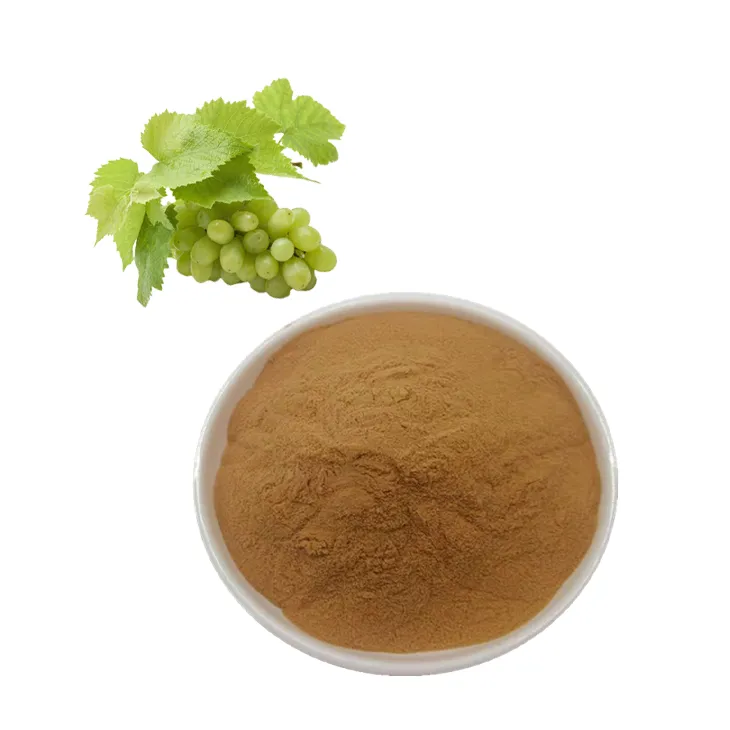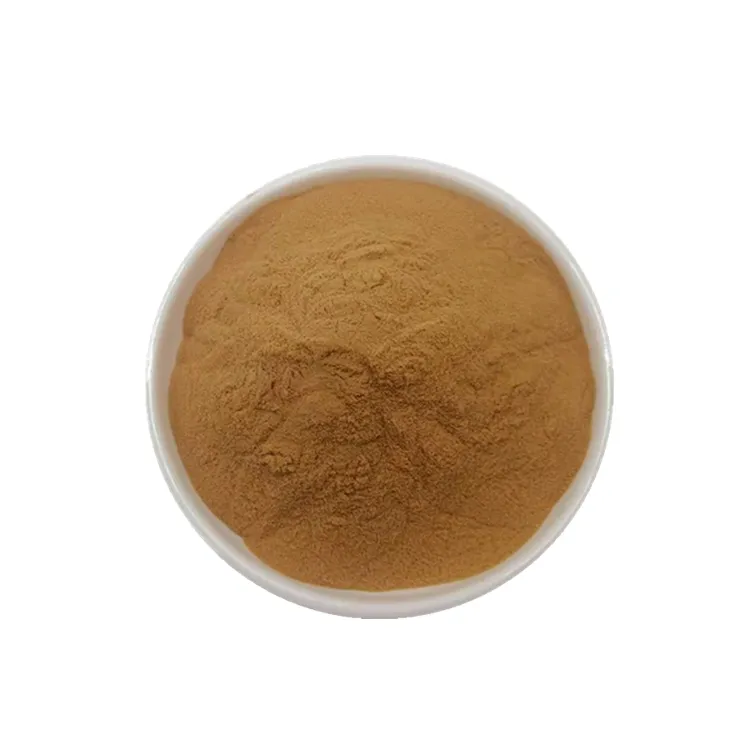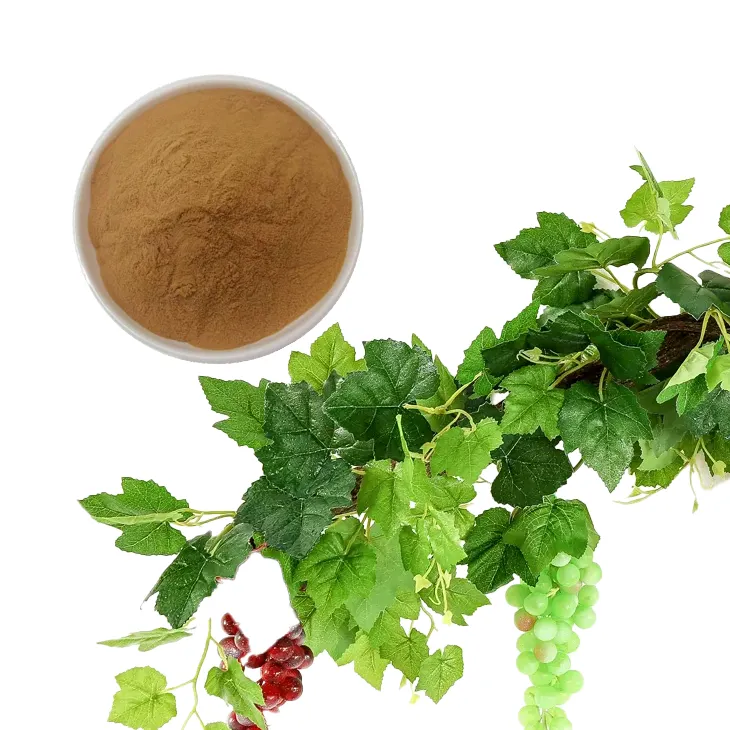- 0086-571-85302990
- sales@greenskybio.com
Use grape leaf extract? Make sure you source from sustainable suppliers!
2024-12-15

1. Introduction
Grape Leaf Extract has gained significant popularity in recent years due to its various potential benefits. It is used in the food and beverage industry, in cosmetics, and also in traditional medicine. However, as consumers, we should not only be concerned about the end product but also about how it is sourced. Sustainable sourcing of Grape Leaf Extract is crucial for several reasons, which we will explore in this article.

2. The Importance of Sustainable Suppliers
2.1 Fair Trade
When we talk about sustainable suppliers, fair trade is an important aspect. Suppliers who follow fair trade principles ensure that the farmers and workers involved in the grape leaf production are paid fairly. This means that they receive a decent wage for their labor, which helps to improve their living standards. For example, in some regions where grapes are grown for leaf extraction, farmers may be at the mercy of middlemen who try to drive down prices. Fair trade suppliers cut out these middlemen or ensure that they operate fairly, thus protecting the interests of the producers.
Moreover, fair trade also promotes better working conditions. Workers are not exploited and are provided with a safe and healthy working environment. This includes proper protection from pesticides and other chemicals used in grape cultivation, as well as reasonable working hours.
2.2 Sustainable Farming Practices
Sustainable suppliers are more likely to encourage and support sustainable farming practices. This is vital for the long - term availability of grape leaves and the overall health of the ecosystem.
- Organic Farming: Many sustainable suppliers promote organic farming methods for grape cultivation. Organic farming avoids the use of synthetic pesticides and fertilizers, which can have harmful effects on the environment and human health. Instead, natural methods such as composting, crop rotation, and biological pest control are used. For example, some farmers introduce beneficial insects like ladybugs to control aphids, which are pests that can damage grape leaves.
- Water Conservation: Grape cultivation requires a significant amount of water. Sustainable suppliers work with farmers to implement water - conservation techniques. This may include drip irrigation systems, which deliver water directly to the roots of the plants, reducing water wastage. In some arid regions where grapes are grown, such water - saving measures are crucial for the long - term viability of the crop.
- Soil Health: Maintaining soil health is another aspect of sustainable farming. Suppliers may encourage farmers to use cover crops, which protect the soil from erosion, improve soil structure, and add nutrients. For example, leguminous cover crops can fix nitrogen in the soil, reducing the need for synthetic nitrogen fertilizers.
2.3 Long - Term Availability
If we do not source Grape Leaf Extract from sustainable suppliers, we risk depleting the resource in the long run. Unsustainable farming practices can lead to soil degradation, water scarcity, and a decline in the quality and quantity of grape leaves.
By choosing sustainable suppliers, we support practices that ensure the long - term availability of grape leaves. For instance, sustainable suppliers may invest in research and development to find new varieties of grapes that are more resistant to pests and diseases or more adaptable to changing climatic conditions. This helps to secure the future supply of grape leaf extract.

3. How to Identify Sustainable Suppliers
3.1 Certifications
One of the easiest ways to identify sustainable suppliers is through certifications. There are several recognized certifications in the agricultural industry that indicate sustainable practices.
- Organic Certifications: Look for suppliers who have organic certifications such as USDA Organic in the United States or EU Organic in Europe. These certifications ensure that the grape leaves are grown without the use of synthetic pesticides and fertilizers and that the farming practices meet certain environmental and ethical standards.
- Fair Trade Certifications: Certifications like Fairtrade International indicate that the supplier adheres to fair trade principles. This means that the farmers and workers involved in the production process are treated fairly, and the supply chain is transparent.
- Sustainable Farming Certifications: Some regions have their own sustainable farming certifications. For example, in some wine - growing regions, there are certifications that focus on sustainable vineyard management, which also applies to grape leaf production. These certifications take into account factors such as water conservation, soil health, and biodiversity.
3.2 Transparency in the Supply Chain
A sustainable supplier should be transparent about their supply chain. This means that they should be able to provide information about where the grape leaves are sourced from, how they are cultivated, and how they are processed.
For example, a good supplier should be able to tell you which farms they work with, what farming practices are used on those farms, and how they ensure the quality and safety of the grape leaf extract. Transparency also helps to prevent issues such as illegal or unethical sourcing, such as using child labor or sourcing from protected areas.
3.3 Reputation and Reviews
Another way to identify sustainable suppliers is through their reputation and reviews. Look for suppliers who have a good reputation in the industry for their sustainable practices.
You can check online reviews from other customers, industry publications, or even ask for references from the supplier. A supplier with a long - standing reputation for sustainability is more likely to be a reliable source of grape leaf extract.

4. The Impact of Unsustainable Sourcing
4.1 Environmental Impact
Unsustainable sourcing of grape leaf extract can have a significant environmental impact. As mentioned earlier, non - sustainable farming practices can lead to soil degradation. For example, the overuse of chemical fertilizers can acidify the soil, making it less fertile and less able to support healthy grape plants.
Water pollution is another concern. Pesticides and fertilizers can run off into water bodies, contaminating water sources and harming aquatic life. In addition, unsustainable water use in grape cultivation can lead to water scarcity in the regions where grapes are grown, affecting not only the grape crop but also other plants and animals in the ecosystem.
Biodiversity loss is also a consequence of unsustainable sourcing. Monoculture farming, which is often associated with non - sustainable grape production, reduces the variety of plant and animal species in the area. This can disrupt the ecological balance and make the ecosystem more vulnerable to pests and diseases.
4.2 Social Impact
On the social front, unsustainable sourcing can have negative impacts on the local communities. If farmers are not paid fairly due to an unfair supply chain, they may struggle to make ends meet and improve their living standards.
Child labor may also be more prevalent in non - sustainable supply chains. In some regions, poor families may be forced to send their children to work in the fields if they are not receiving a sufficient income from the grape production. This is a serious ethical issue that can be avoided by sourcing from sustainable suppliers.
5. Conclusion
In conclusion, when using grape leaf extract, it is essential to source from sustainable suppliers. This not only ensures that we are getting a high - quality product but also that we are contributing to the well - being of the environment, the farmers, and the workers involved in the production process.
By considering factors such as fair trade, sustainable farming practices, and long - term availability, we can make an informed choice when it comes to obtaining grape leaf extract. We should also be vigilant in identifying sustainable suppliers through certifications, supply chain transparency, and reputation. Avoiding unsustainable sourcing is crucial for the future of grape leaf extract and for the overall health of our planet and its people.
FAQ:
Q1: Why is it important to source grape leaf extract from sustainable suppliers?
It is crucial to source from sustainable suppliers because it ensures fair trade. This means that the farmers and workers involved in the production of grape leaf extract are paid fairly for their labor. Sustainable farming practices are also promoted, which are better for the environment. These practices can help maintain soil quality, conserve water, and reduce the use of harmful pesticides and fertilizers. Additionally, sourcing from sustainable suppliers helps ensure long - term availability of the extract. If the extraction process is not sustainable, it could lead to over - harvesting and depletion of grape leaves, making it difficult to obtain the extract in the future.
Q2: How can one identify a sustainable supplier of grape leaf extract?
There are several ways to identify a sustainable supplier. Look for certifications such as organic certifications, which indicate that the farming practices are more environmentally friendly. Check if the supplier follows fair trade principles, which can often be verified through fair trade labels or membership in fair trade organizations. Research the supplier's farming methods to ensure they are using sustainable techniques like crop rotation and water conservation. Also, consider their reputation in the industry. A supplier with a long - standing positive reputation is more likely to be sustainable.
Q3: What are the benefits of sustainable farming practices in grape leaf extraction?
Sustainable farming practices offer multiple benefits. Firstly, they protect the environment by reducing pollution and conserving natural resources. For example, by using less pesticides and fertilizers, there is less chemical runoff into water sources. Secondly, it can lead to higher - quality grape leaves. When the soil is well - maintained through sustainable practices, the plants grow healthier, resulting in leaves with better nutritional content and more effective extract. Thirdly, it helps in the long - term viability of the grape leaf extract industry by ensuring a continuous supply of raw materials.
Q4: Are there any regulations regarding sustainable sourcing of grape leaf extract?
There may be some regulations in certain regions. Some countries have environmental protection laws that indirectly affect the sourcing of grape leaf extract. For example, laws regarding water usage, pesticide use, and land conservation can influence how grape leaves are farmed. Additionally, in the context of fair trade, there are international standards and regulations that suppliers may need to adhere to in order to claim fair trade status for their products. However, the specific regulations can vary widely depending on the location and the market.
Q5: How does fair trade relate to sustainable sourcing of grape leaf extract?
Fair trade is an important aspect of sustainable sourcing. When a supplier follows fair trade principles, it ensures that the farmers and workers involved in the grape leaf production are treated fairly. This includes paying them a fair wage, providing safe working conditions, and often investing in the local community. Fair trade also encourages sustainable farming practices because it values the long - term viability of the production process. By paying a fair price for the grape leaves, it gives farmers the incentive to invest in sustainable methods rather than taking shortcuts for short - term gain.
Related literature
- Sustainable Sourcing of Botanical Extracts: A Comprehensive Review"
- "The Importance of Fair Trade in the Botanical Extract Industry"
- "Sustainable Farming and the Long - Term Availability of Grape Leaf Extract"
- ▶ Hesperidin
- ▶ Citrus Bioflavonoids
- ▶ Plant Extract
- ▶ lycopene
- ▶ Diosmin
- ▶ Grape seed extract
- ▶ Sea buckthorn Juice Powder
- ▶ Fruit Juice Powder
- ▶ Hops Extract
- ▶ Artichoke Extract
- ▶ Mushroom extract
- ▶ Astaxanthin
- ▶ Green Tea Extract
- ▶ Curcumin
- ▶ Horse Chestnut Extract
- ▶ Other Product
- ▶ Boswellia Serrata Extract
- ▶ Resveratrol
- ▶ Marigold Extract
- ▶ Grape Leaf Extract
- ▶ New Product
- ▶ Aminolevulinic acid
- ▶ Cranberry Extract
- ▶ Red Yeast Rice
- ▶ Red Wine Extract
-
Gynostemma pentaphyllum extract
2024-12-15
-
Elderberry Extract
2024-12-15
-
Tamarind extract powder
2024-12-15
-
Saponin Extract
2024-12-15
-
Boswellia Serrata Extract
2024-12-15
-
Lemon Extract
2024-12-15
-
Dan Shen Root Extract/Salvia Root Extract
2024-12-15
-
Polygonum multiflorum extract
2024-12-15
-
Beetroot juice Powder
2024-12-15
-
Withania Somnifera Extract
2024-12-15





















